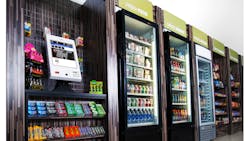What is a micro market?
Micro markets started as small unattended food retail setups that could transform the mundane breakroom into a self-service convenience store where employees purchased food and beverage options without having to leave the building. Micro markets were traditionally limited to "closed" environments where most of the daily traffic was part of a known population.
Today, micro market technology has advanced to tackle high-traffic areas including hotel lobbies, airports, college campuses and more. These markets are generally maintained by food service operators (FSO) who source the equipment, brand and stock the markets based on the needs of the business or facility in which the market exists. FSOs are essentially the merchant with whom employees, students or customers conduct business when they make autonomous purchases at a micro market. They are no different than the owner and manager of a traditional store, with the exception that FSOs do not require staff to run the market. That low overhead is a built-in cost saver for businesses who are beginning to consider enhancing their facility with micro markets.
How does an unattended store work?
Similar to the self-checkout functionality at your favorite grocery store, retail shop, or pharmacy, a micro market leverages a self-service kiosk during checkout for maximum convenience. However, instead of an entire store front, micro markets optimize small spaces to facilitate prime product placement, putting a consumer’s meal and snacking desires within reach. Micro markets often feature grab-and-go food for consumers to enjoy quickly and conveniently. However, they also offer healthier items and fresher food choices as well as other non-food items that could be in high demand.
How can micro markets benefit my business?
Micro markets can prove a beneficial tool for any business. Office-based businesses can leverage the gift card functionality found in some micro markets to celebrate employee birthdays or business anniversaries. Businesses can even subsidize certain items as part of an employer wellness, award or benefit program. Educational institutions can offer loyalty rewards to students and staff for frequent purchases or simply offer items that this demographic often forgets to bring with them such as flash drives, pens, clickers and more. Fitness centers can leverage a micro market to offer locks, small fitness equipment and healthy snacks and energy drinks needed to jumpstart their clients or replenish them after rigorous exercise. No matter the industry, micro markets have a strong use case.
Which manufacturers are at the helm of the micro market industry?
365 Retail Markets has redefined the unattended retail experience with its Connected Campus. This first-of-its-kind, fully-integrated, consumer experience ecosystem seamlessly connects a location’s 365-based micro market, office coffee service (OCS), vending and dining technology. Leveraging a Global Market Account (GMA), your employees or customers can create and fund accounts, view purchase history, scan and pay for products, and connect to any location’s 365 devices directly or via mobile app.
Micro markets are essentially another innovative mechanism to enhance experiences and simplify the lives of various people spanning almost any industry. Don’t have one in you building? Learn more about micro markets or other unattended retail opportunities at www.365RetailMarkets.com.
Resources
